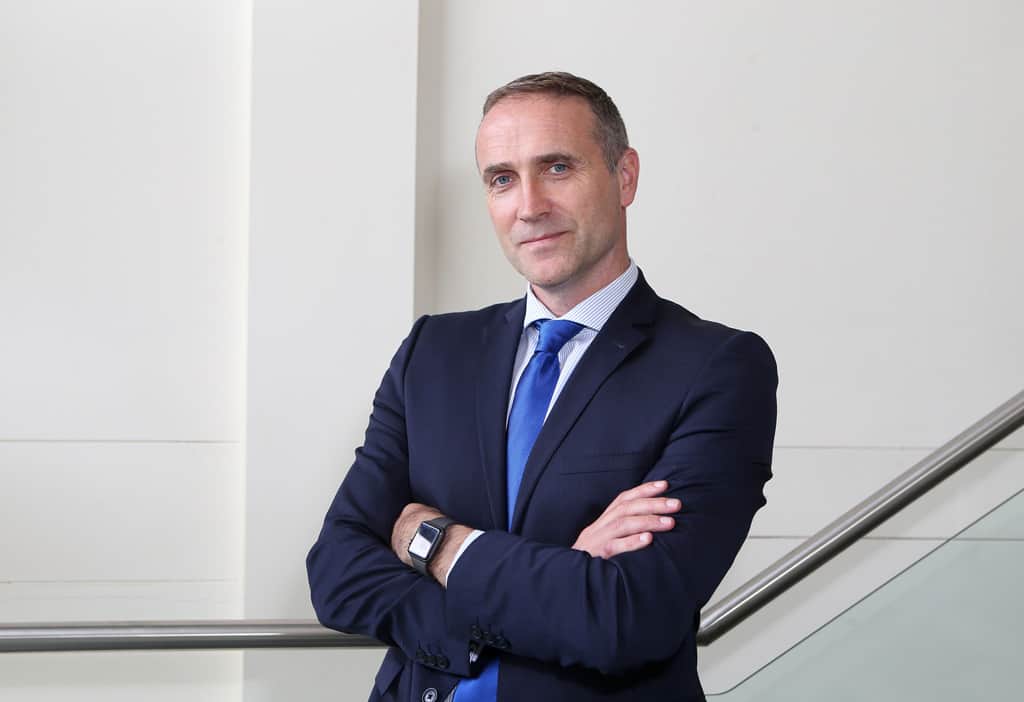In our next CEO Q&A, Geoff Higgins, CEO of Decision Time, speaks to us about growth, recruitment and customer satisfaction.
My number one priority is the success of the organisation. At Decision Time we drive success by hiring and retaining the best people in order to provide products & services that our customers love. High customer satisfaction and a 98% customer retention rate allows us to achieve managed profitable growth. We are midway through a three-year plan taking us to 2020 which sets out revenue growth of 33% year on year while maintaining an increase of 20% in net profit. I have always had a hands-on approach; and, as we grow, the biggest challenge is to let other capable people take on more responsibility for the day to day running of the business. I need to focus on ensuring that our effort is always aligned with our strategic goals. Another major challenge for Decision Time, and for anyone else operating in the Irish tech sector, is recruiting and retaining the best technical staff from a relatively small pool of talent and in the face of competition from much larger organisations. Very simply, by treating people right. Our Investors in People Silver Award is a result of putting our staff at the heart of everything we do at Decision Time. We have many formal and informal processes that are designed with a core objective in mind: to retain a happy, motivated and rewarded workforce. In the technology sector we face serious competition in attracting the right people so we have to be totally committed to employee retention. But we have learned over the years that different things motivate different people and so a blanket approach won’t work. For that reason we try to use a range of rewards and recognition methods to suit each individual. We also invest time and resources in communicating corporate and departmental objectives across the whole organisation. Everyone at Decision Time, from the most junior staff member to the Directors, has a thorough understanding of how their work contributes to the success of the business. Knowing the vital role each individual plays really improves employee engagement. The biggest challenge for the tech sector in Ireland is the skills shortage – it’s been a well-known issue for over a decade now and, while a number of sticking plasters have been applied to the problem, government and other stakeholders have not come up with a sustainable solution so far. I think the major trends are the continued growth of Cloud Computing, Artificial Intelligence and the Blockchain. I had a huge interest in science fiction growing up and it’s fascinating to watch science fiction become reality, especially in relation to Artificial Intelligence. Of course, as Spiderman’s Uncle Ben reminds us, “With great power comes great responsibility.” Yes, a new approach in the education sector towards Information Technology is needed. If we are ever going to solve the skills shortage in the IT sector we need to encourage a higher number of quality teachers, with specialist IT skills, into the primary and post-primary schools. Universities and colleges need to be much more agile in matching their courses to the up-to-date needs of business. We also need to encourage greater diversity in the tech world with better initiatives to encourage programming as a great career choice for women and people from a range of backgrounds and experiences. Yes and I don’t think this is going to change in the short and medium term. Until we know what type of Brexit we are getting I can’t say how it will impact Decision Time. So far, we haven’t felt any effects but we have made provisions for various scenarios. We now have hosting options in both the UK and Ireland and are considering opening an office in Dublin. Fortunately for Decision Time we operate across the private, public and non-profit sectors in the UK and Ireland. During the crisis, we shifted focus to the UK public sector which was much less affected. Having a diverse customer base and products that appeal to a range of different customers was a real benefit. Personally, I believe the crisis itself created a much better understanding of the need for better corporate governance, organisational performance and organisational risk management. I learned at an early age, in my parents’ construction business, that success in business starts with doing a great job that makes the customer happy. Keeping it as simple as this has always served me well. My drive to succeed comes from the belief that there is a massive opportunity for Decision Time in delivering a proven set of tools for business leaders that will genuinely help them make better decisions. The best advice I was given in business was to make sure our annual recurring revenue exceed our annual costs. Having this level of financial security means that you can make long term sustainable decisions for the business. 2018 was a big year for us. It started with the appointment of Colin Reid, former CEO of Total Mobile, as non-executive Chairman. A full strategic review was followed by a rebrand, moving away from our previous name of Team Solutionz to Decision Time. We had new staff join the business, growing our consultancy, sales and technical teams. The company saw significant growth of 45% in our customer base, formed new partnerships and had some great wins with exciting customers such as Ofwat, HM Land Registry, Enterprise Ireland, Failte Ireland, StatSports and Dublin Airport Authority to name but a few. We competed with and won against the biggest competitors in the world and ultimately achieved the year one target of our three year strategic growth plan. Oh, and I turned 50. We intend to have an even bigger and better 2019! Exciting times, I’d say. The value that our platform provides to help decision makers make better decisions is now well proven across many sectors and we expect this growth phase to continue. Competitors will emerge but we will welcome that as we continue to build the market for Corporate Governance tools. Before we even consider the new solutions we have in the development pipeline, we see some very immediate areas for growth within the current Decision Time platform. We are targeting profitable growth of 33% and have good reason to believe we will hit this target. To help achieve this we will be growing the team, with key new positions in all areas of the business. On the customer side, we will want to see further penetration of our key sectors such as Public Sector, Housing and the Credit Union, as well as success in newly targeted areas in the private sector.Q. What are your main priorities and goals in your role?
Q. What are your biggest challenges as CEO?
Q. How do you keep your team/staff motivated?
Q. What are the challenges facing the industry going forward?
Q. What new trends are emerging in your industry?
Q. Are there any major changes you would like to see in your sector?
Q. As an employer are you finding any skill gaps in the market?
Q. How will Brexit affect you, or have you started to feel the effects already?
Q. How did your strategy develop in the context of the banking crisis and economic crisis?
Q. How do you define success and what drives you to succeed?
Q. What’s the best advice you’ve been given, or would give, in business?
Q. What have been your highlights in business over the past year?
Q. What’s next for your company?
Q. What opportunities or plans for growth do you see in 2019?
Firstly, across the public and private sectors, there is a growing awareness of the need for organisational governance, the clear, focused management of risk, and of the need to measure performance against defined targets. Decision Time has seen an uplift in interest for solutions that help manage these important challenges. We intend to further capitalise on this demand by ensuring that our software has the relevant functionality to manage these issues, that we have the right people in place and maintain the level of customer service that our growing client portfolio demands.
Secondly, we have more and more customers talking to us about taking what was originally a set of board-level tools and rolling it out as a much wider enterprise efficiency tool. Organisations are seeing the opportunity to standardise on improved governance processes, reduce the use of paper and reap the benefits of better decision making, risk management and strategic planning at all levels. What this ultimately means is that large organisations will no longer be asking for 25 or 30 users, but purchasing 400 or 500 users of the Decision Time platform.Q. Where do you want your business/brand to be this time next year?
Success in business starts with doing a great job that makes the customer happy. Keeping it as simple as this has always served me well.






